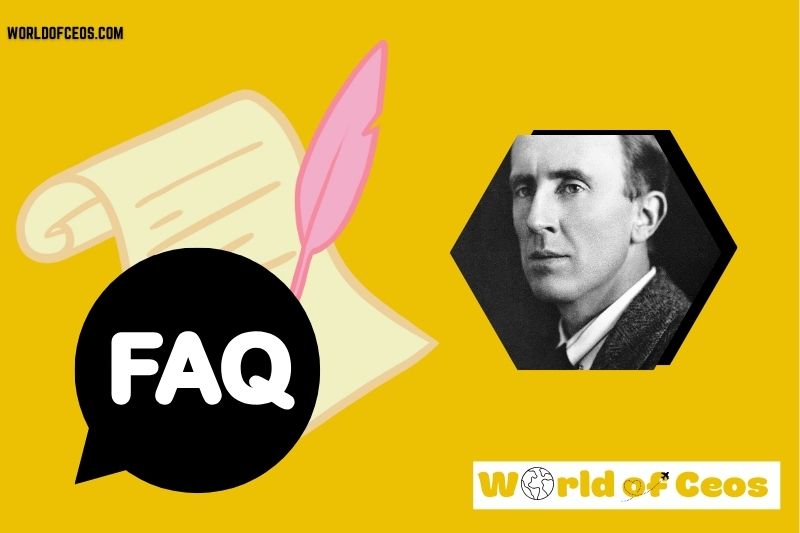J.R.R. Tolkien, the creator of The Hobbit and The Lord of the Rings, is a name synonymous with the fantasy genre.
His literary works not only redefined storytelling but also established him as one of the most influential figures in modern literature.
Beyond his artistic achievements, his financial legacy is just as fascinating.
Let’s delve into Tolkien net worth and explore how his iconic works, collaborations, and licensing deals have contributed to his wealth.
Quick Facts
| Fact | Detail |
|---|---|
| Real Name | John Ronald Reuel Tolkien |
| Popular Name | J.R.R. Tolkien |
| Gender | Male |
| Birth Date | January 3, 1892 |
| Age | 81 (Died: September 2, 1973) |
| Parents | Arthur Reuel Tolkien, Mabel Tolkien |
| Siblings | Hilary Arthur Reuel Tolkien |
| Birthplace | Bloemfontein, Orange Free State |
| Nationality | English |
| Ethnicity | German and English descent |
| Education | Exeter College, Oxford |
| Marital Status | Married |
| Spouse | Edith Tolkien (m. 1916–1971) |
| Children | Christopher Tolkien, Michael Tolkien, Priscilla Reuel Tolkien, John Francis Reuel Tolkien |
| Dating | N/A |
| Net Worth | $50 million (at death) |
| Source of Wealth | Writing, licensing, royalties |
| Height | 5 ft 9 in (1.74 m) |
What is the Net Worth of Tolkien in 2024?

As of 2024, J.R.R. Tolkien’s estate continues to generate significant revenue through royalties, licensing, and adaptations.
His net worth at the time of his death was estimated at $50 million, and the Tolkien Estate has since earned over $500 million.
This positions him among the most financially successful literary figures, alongside other notable names.
Related figures in the literary and film world include:
- C.S. Lewis
- George R.R. Martin
- J.K. Rowling
- Philip Pullman
- Christopher Tolkien
- Peter Jackson
- Amazon Studios
- New Line Cinema
- Oxford University
- J.R.R. Tolkien Estate
Learn more about the wealthiest authors in literature by visiting top-earning authors.
Tolkien Wealth, Salary, and Finance Overview

How His Achievements Shaped His Financial Legacy
J.R.R. Tolkien’s journey to financial success began with his education at Exeter College, Oxford, where he graduated with honors in English.
This academic foundation equipped him to create masterpieces like The Hobbit and The Lord of the Rings.
His works not only gained critical acclaim but also resonated with readers worldwide, making him an enduring figure in literature.
Major Works and Their Contribution to His Wealth
Tolkien’s wealth was significantly influenced by the commercial success of his major works. The Hobbit, published in 1937, became an instant success, opening doors to sequels and adaptations.
The Lord of the Rings trilogy, published between 1954 and 1955, cemented his status as a literary giant.
These works collectively generated billions in revenue through book sales, merchandise, and film adaptations, ensuring his estate’s long-term profitability.
Collaborations and Licensing Agreements
His estate strategically partnered with film studios to adapt his works, most notably with New Line Cinema for The Lord of the Rings trilogy.
These films not only brought the stories to new audiences but also led to financial disputes that highlighted the immense value of Tolkien’s creations.
In 2017, Amazon Studios acquired the rights to adapt his works for $200 million, showcasing the timeless appeal and financial potential of his narratives.
Awards and Honors That Elevated His Reputation
Tolkien’s achievements earned him prestigious accolades, such as being named Commander of the Order of the British Empire in 1972.
This recognition, coupled with his scholarly work as a professor at Oxford, further enhanced his reputation, contributing to the commercial success of his works.
Ongoing Influence of His Estate on Revenue
The Tolkien Estate meticulously manages his legacy, ensuring that his works remain culturally relevant. Royalties from books, film rights, and merchandise continue to generate millions annually.
The estate’s collaboration with Amazon Studios has also opened new revenue streams, particularly through streaming and extended adaptations.
Factors Behind His Lasting Financial Success
His ability to create a deeply immersive fantasy world was unparalleled. His works’ adaptability to different mediums, from books to films and streaming, has kept them relevant.
Advances in technology have also amplified his legacy, allowing his estate to reach global audiences and sustain revenue growth.
FAQs about Tolkien

What inspired Tolkien to create Middle-earth?
He drew inspiration from his academic background in Old English literature, mythology, and personal experiences, including his service in World War I.
Who manages his estate today?
The Tolkien Estate is managed by his descendants, including Christopher Tolkien until his death in 2020.
How much did Amazon pay for Tolkien’s rights?
Amazon Studios acquired the rights to adapt Tolkien’s works for $200 million.
What are his most famous works?
His most notable works include The Hobbit, The Lord of the Rings trilogy, and The Silmarillion.
Did he influence modern fantasy literature?
Yes, Tolkien is often regarded as the “father of modern fantasy literature” due to his pioneering contributions to the genre.
What awards did Tolkien receive during his lifetime?
He was named a Commander of the Order of the British Empire in 1972 and received an honorary doctorate from Oxford University.
How did World War I affect Tolkien’s writing?
His experiences in the war influenced the themes of heroism, loss, and friendship found in his works.
How has technology impacted his legacy?
Advances in media technology have enabled adaptations of his works, reaching wider audiences and sustaining his financial legacy.
Are there any upcoming adaptations of his works?
Amazon’s series The Rings of Power is the latest adaptation, exploring the Second Age of Middle-earth.
Conclusion
Tolkien’s legacy as a literary icon and financial success story continues to captivate audiences worldwide.
His works have transcended generations, creating a cultural and financial impact that endures to this day. At worldofceos, we welcome your thoughts—comment, share, and explore more on our website.

